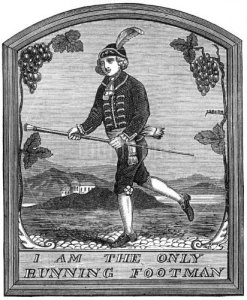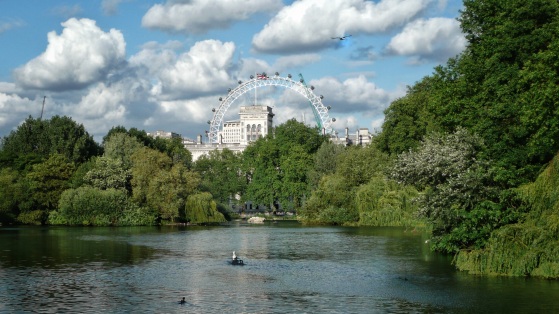One leg up and one leg down like an old cock sparrer, flyin’ over Piccadilly with me bow an’ arra. Sydney Carter, Eros
Eros has had a good Brasso session and is looking grand in the intermittent summer sunshine. The skylines of Regent Street, Piccadilly, and Shaftsbury Avenue look gorgeous in their Georgian and Regency splendour. The traffic is terrible and the tourists throng in confused and bemused bunches. The theatres still advertise musicals I would never see in a month of Sundays. The royal parks are in full bloom and abound with swans, geese and ducks and their young families. Soho looks as tacky as ever. And although Carnaby Street looks like, well, just any other street, and Swinging London is a fading artifact of the past, London is London as it always was and always will be in my mind’s eye and in my memories.
There is something about London. It’s in the air and it’s in the paving stones, in the crowds and the smell of the rain (lots of it). I have been coming back here every few years for over thirty years. And it still feels like coming home. As time goes by, you forget more than you remember, but random memories come breaking through the years, your thoughts wind back to way back when. London with its technicolor costume of colour, creeds and complexions, it’s paradoxes of posh and poor, it’s troves of trash and treasure.
In 1777, celebrated essayist Samuel Johnson said “when a man is tired of London, he is tired of life”. A cliché, yes, over-used and over-quoted, oft times, out of context. A cover story of Time Magazine on ‘Swinging London’ in April 1966 was entitled “You can walk across it on the grass’. That was and remains part of the magic of the place. That, and its art, its architecture, its history. “Don’t look at”, they say, “look up!” And, exploring the main streets, mean streets and backstreets, parks and parade grounds, mews and alleys of Old London, I always reckoned that old Sam got it spot on – and still do today, whenever I chance to return.
And adjacent, in Hayes Mews, the hostelry with the longest pub name in London, ‘The Only Running Footman’. Such a magical name, it was, conjuring up motion and majesty, speed and style. And it remained in my mind this half-century hence. I had an affinity with this anonymous, antique athlete. These were my running days. I ran everywhere. To the underground, to work, to the shops, to the pub (but not back), though the city, around the town. I revelled in the movement, in the freedom, in the physical and psychological exhilaration of it all. My running days are long over, but I still run in my dreams
These were days of adapting to new environments and circumstances. They were exciting, they were challenging. I was young, restless, at turns, idealistic and cynical, puritanical and hedonistic. In retrospect, days of emotional and intellectual ferment. Days of “finding one’s way in the world”. Not some reformationey, renaissancial, enlightenment thingy. Post-adolescent onanism, more like.
As John Lennon sang: “Strange days indeed. Most peculiar, Mama!“ Irish bombs, miners’ strikes, power cuts, rubbish piled up on streets, and economic recession. A three-day week as England closed down for want of coal. Candles and coldness. Late starts and early finishes. A stack of books left in the lift in case I was caught when the lights went out. In one job, I’d walk through a bomb shattered foyer, into the mail room, to put all the mail thru a whopping great X ray machine to see if the paddies had sent us any letters. The police arrested my bike when I left it chained to a parking meter – in case it was used to hide a bomb. And you would actually hear explosions as you went about your business. Arriving at a much smaller Heathrow Airport, finding it surrounded by armoured cars and armed soldiers and police. I got a kick out of the blitz-like solidarity, the trench humour, and deprivation and darkness. Layla rocked a London that was neither as drear not as dammed as some paint it. Back then, I was in love with the place. I was young, idealistic, and as the poet said “Bliss was it in that dawn to be alive, but to be young was very heaven!“
From Tabula Rasa – Poems of Paul Hemphill , Volume One



[…] See also The Spirit of ’45 and Something About London. […]
[…] For more about London in In That Howling Infinite, see: Back in the Day – my journey, in song and poetry; A Window on a Gone World – London days; Song of the Rand – my hitchhiking days; Something about London […]
[…] For more about London in In That Howling Infinite, see: Back in the Day – my journey, in song and poetry; A Window on a Gone World – London days; Song of the Rand – my hitchhiking days; Something about London; […]
[…] Something About London […]
[…] Something About London […]